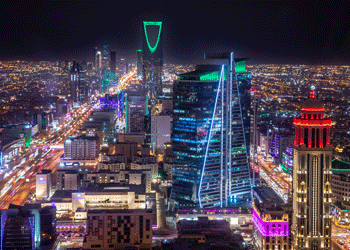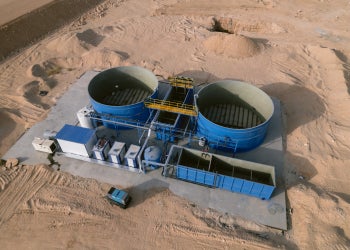Aramco steps in to boost Saudi steel potential
10 May 2023

As the main engine facilitating Saudi Arabia’s Vision 2030 socio-economic transformation, Saudi Aramco is working to ensure its localisation initiatives meaningfully contribute to the programme.
The company is intensifying its localisation efforts by cultivating an in-kingdom supply chain to not only meet its business requirements, but also create specialised jobs for Saudi nationals.
Local manufacturing is a major element of this strategy, and Aramco has made key investments in the production of steel products – a vital business requirement – as part of its commitment.
SeAH Gulf Special Steel Industries (GSI), a joint venture (JV) in which Aramco is a stakeholder, began constructing a facility in February that will mainly produce steel pipes. The estimated $240m factory is located in the King Salman Energy Park (Spark) industrial facility. When it enters operation in 2025, it will have the capacity to produce 20,000 tonnes a year (t/y) of stainless steel seamless pipes and tubes.
On 1 May, Aramco entered into another JV to establish an integrated steel plate manufacturing complex in Saudi Arabia, which will help “increase localisation of the steel value chain”, according to Fahad M al-Abdul Kareem, senior vice-president of Industrial Services at Aramco.
Ras al-Khair steel complex
Aside from Aramco, the JV that will build the steel-plate production complex includes the kingdom’s sovereign wealth institution, the Public Investment Fund (PIF), and the Chinese steel manufacturing conglomerate Baoshan Iron & Steel Company (Baosteel).
The complex, deemed the first of its kind in Saudi Arabia, will be located in Ras al-Khair in the kingdom’s Eastern Province, which was recently designated as one of four new Special Economic Zones by Saudi Crown Prince Mohammed bin Salman.
The planned facility will have an output capacity of 1.5 million t/y and “serve strategic industrial sectors including pipelines, offshore platforms, rigs, tanks, pressure vessels, shipbuilding and others”, Al-Abdul Kareem tells MEED.
“The complex will bring together Aramco’s unrivalled energy and industrial services ecosystem, Baosteel’s advanced steel plate industry capability and PIF’s investment expertise,” he says.
Engineering, procurement and construction work on the project has been divided into several packages, which will be tendered soon, with a contract award expected by the second half of this year.
The steel complex will be able to start operating with hydrogen fuel without major equipment modifications as soon as the new hydrogen technology is ready
Fahad M al-Abdul Kareem, Aramco
Environmental impact
“This complex aims to be one of the lowest-carbon emissions, large-scale steel plate manufacturing facilities in the world based on currently announced projects,” says Al-Abdul Kareem.
Aramco signed a memorandum of understanding with Baosteel to conduct an engineering and feasibility study for the proposed steel plate complex in September 2021.
The plant will be equipped with a natural gas-based direct reduced iron (DRI) furnace and an electric arc furnace to reduce carbon dioxide (CO2) emissions from the steel-making process by up to 60 per cent compared with a traditional blast furnace, Aramco announced recently.
“The steel complex has also been designed to be hydrogen-compatible as a substitution for natural gas,” Al-Abdul Kareem adds. “It will therefore be able to start operating with hydrogen fuel without major equipment modifications as soon as the new hydrogen technology is ready for application.”
“This would enable the complex to make steel with up to 90 per cent less CO2 emissions than traditional coal-based steel production processes,” he explains.
Economic contributions
The steel plate factory’s workforce is expected to comprise 80 per cent Saudi nationals to meet Aramco’s Saudisation goals, he says. It is also projected to contribute $1.7bn to Saudi Arabia’s GDP every year.
The JV aims to export 30 per cent of its capacity to Middle East and North Africa (Mena) markets. “Through this plant, the kingdom is expected to be able to substitute imports by amounts close to SR4.9bn, or $1.3bn, annually,” says Al-Abdul Kareem.
To maximise its economic potential, the proposed complex will receive support from the Saudi government’s Shareek incentives programme for large companies. It has also been brought under Aramco’s Namaat local industrial investments programme.
“This project has the potential to create a tangible impact on the kingdom’s economy and contribute to Saudi Arabia’s GDP growth, generate new jobs, support the [In-Kingdom Total Value Add] iktva programme targets by adding to the local content production and lead to considerable import substitution,” the Aramco executive concludes.
Exclusive from Meed
-
 Solar deals signal Saudi Arabia’s energy ambitions
Solar deals signal Saudi Arabia’s energy ambitions13 February 2026
-
 Saudi Arabia appoints new investment minister
Saudi Arabia appoints new investment minister13 February 2026
-
 Indian firm wins major Oman substation contract
Indian firm wins major Oman substation contract12 February 2026
-
 Developers appoint contractor for $500m wastewater treatment project
Developers appoint contractor for $500m wastewater treatment project12 February 2026
-
 Dewa raises Empower stake in $1.41bn deal
Dewa raises Empower stake in $1.41bn deal12 February 2026
All of this is only 1% of what MEED.com has to offer
Subscribe now and unlock all the 153,671 articles on MEED.com
- All the latest news, data, and market intelligence across MENA at your fingerprints
- First-hand updates and inside information on projects, clients and competitors that matter to you
- 20 years' archive of information, data, and news for you to access at your convenience
- Strategize to succeed and minimise risks with timely analysis of current and future market trends

Related Articles
-
 Solar deals signal Saudi Arabia’s energy ambitions
Solar deals signal Saudi Arabia’s energy ambitions13 February 2026
 Commentary
Commentary
Mark Dowdall
Power & water editorSaudi Arabia’s recent agreement to build $2bn-worth of solar power plants in Turkiye is the latest sign that the kingdom’s energy influence is changing.
Historically, this was measured in oil barrels and export volumes. Increasingly, this is extending to capital, structuring expertise and the ability to deliver record-low tariffs in competitive markets.
Announcing the deal, Turkish Energy Minister Alparslan Bayraktar said tariffs for the plants would be the country’s lowest on record, with electricity purchased under 25-year power purchase agreements.
It followed another announcement, in January, that Acwa is investing $200m to build a large-scale solar photovoltaic (PV) plant in the Philippines.
Whether Saudi-backed companies ultimately retain long-term stakes or primarily develop and build the assets, their role at the front end is significant.
Sponsors that bring sovereign backing, clear procurement processes and access to low-cost financing can influence tariffs and contract terms from the outset.
There is also a geopolitical layer. Investing in Turkiye, or anywhere for that matter, strengthens political and economic ties at a time when regional alignments are shifting.
Energy infrastructure is also long-term by its nature. It connects ministries, regulators, lenders and operators in relationships that often extend well beyond a single transaction.
Saudi Arabia has spent the past few years refining its approach to pricing, structuring and financing large-scale renewables at home.
Exporting that expertise may not rival oil in scale or visibility, but it does signal that Saudi Arabia is becoming more than just an energy supplier.
Increasingly, it is becoming a participant in how other countries design and finance their energy transitions. That influence is still significant.
https://image.digitalinsightresearch.in/uploads/NewsArticle/15645903/main.jpg -
 Saudi Arabia appoints new investment minister
Saudi Arabia appoints new investment minister13 February 2026
Register for MEED’s 14-day trial access
King Salman Bin Abdulaziz Al-Saud has made a series of senior government changes, including Khalid Al-Falih leaving his role as investment minister to become minister of state and a member of the cabinet.
Al-Falih has been replaced by Fahad Al-Saif as investment minister. Al-Saif has been head of the Investment Strategy and Economic Insights Division at the Public Investment Fund (PIF) since 2024. That role involved formulating PIF’s long-term investment strategy. He has also served as head of the Global Capital Finance Division, a role he has held since joining PIF in 2021.
The change of investment minister comes at a time when securing investments has become a key priority for Saudi Arabia as it prepares to hand over more projects to the private sector for delivery.
King Salman also named Abdullah Al-Maghlouth as vice-minister of media and Abdulmohsen Al-Mazyad as vice-minister of tourism. Khalid Al-Yousef was named attorney general, and Sheikh Ali Al-Ahaideb will serve as president of the Board of Grievances.
Faihan Al-Sahli was selected as director general of the General Directorate of Investigation, while Abdulaziz Al-Arifi was chosen to lead the National Development Fund. Haytham Al-Ohali will head the Communications, Space and Technology Commission, and Fawaz Al-Sahli will chair the Transport General Authority.
https://image.digitalinsightresearch.in/uploads/NewsArticle/15645415/main.gif -
 Indian firm wins major Oman substation contract
Indian firm wins major Oman substation contract12 February 2026

India’s Larsen & Toubro has won a contract to build the Majan 400/220/132kV grid station in Oman.
Estimated to cost $100m, the project includes an associated 400kV line-in line-out underground cable from Sohar Free Zone to the Sohar Interconnector Station.
The contract was awarded by Oman Electricity Transmission Company (OETC), part of the government-owned Nama Group.
The grid station will comprise eight 400kV gas-insulated switchgear (GIS) bays, eight 220kV GIS bays and 10 132kV GIS bays at the new Sohar Free Zone substation.
The scope includes the installation of two 500MVA, 400/220kV transformers and two 500MVA, 220/132kV transformers.
Local firm Monenco Consulting Engineers was appointed in April last year to provide design and supervision services for the project.
As MEED exclusively revealed, the main contract was tendered in June, as part of three significant contracts to build new substations in the sultanate.
The second contract, worth about $35m, covers the construction of the Sultan Haitham City 132/33kV grid station and associated 132kV line-in line-out underground cables running 4 kilometres from Mabella to Mabella Industrial Zone.
The third contract, valued at about $100m, covers the construction of the Surab 400/33kV grid station and an associated 400kV line-in line-out cable from the Duqm grid station to the Mahout grid station.
Local firms Muscat Engineering Consulting and Hamed Engineering Services are consultants for the Sultan Haitham City and Surab projects, respectively.
The two remaining contracts are currently under bid evaluation, with awards expected this quarter.
https://image.digitalinsightresearch.in/uploads/NewsArticle/15638107/main.jpg -
 Developers appoint contractor for $500m wastewater treatment project
Developers appoint contractor for $500m wastewater treatment project12 February 2026

Register for MEED’s 14-day trial access
Egypt’s Orascom Construction has won the engineering, procurement and construction (EPC) contract for a major wastewater treatment project in Saudi Arabia’s Eastern Province.
A consortium of Saudi utilities provider Marafiq, the regional business of France’s Veolia and Bahrain/Saudi Arabia-based Lamar Holding is developing the $500m (SR1.875bn) industrial wastewater treatment plant (IWWTP) in Jubail Industrial City 2.
Sources close to the project confirmed the appointment to MEED, adding that the project has now entered the construction phase.
Industry sources also said that financial close on the project is expected to be reached in the coming days.
In September, the developer consortium was awarded a contract, under a 30-year concession agreement, by Saudi Aramco Total Refining & Petrochemical Company (Satorp), a joint venture of Saudi Aramco and France’s TotalEnergies.
The planned facility will treat and recycle wastewater from Satorp’s under-construction Amiral chemical derivatives complex, also in Jubail.
Marafiq, formally Power & Water Utility Company for Jubail and Yanbu, will own a 40% stake in the dedicated project company. Veolia Middle East SAS will hold a 35% stake, and Lamar Holding’s Lamar Arabia for Energy will hold the other 25%.
The planned IWWTP, which will primarily serve the $11bn sprawling Amiral chemicals zone, will implement advanced water treatment and recovery technologies to process complex industrial effluents, including spent caustic streams. Treated water will be reintegrated into the industrial processes, supporting closed-loop reuse and energy efficiency.
The project follows a concession-style model, akin to a public-private partnership (PPP), where the developer consortium invests in, builds and operates the wastewater plant over a 30-year period, with returns linked to service delivery.
Marafiq has been involved in several similar projects across Saudi Arabia, including as the sole owner of the Jubail industrial water treatment plant (IWTP8), which treats complex industrial effluents for petrochemical and heavy industrial companies.
In 2020, Saudi Services for Electro Mechanic Works was awarded the $202m main contract for the fourth expansion phase of IWTP8. Construction works on the project are expected to be completed by the end of the quarter.
 READ THE FEBRUARY 2026 MEED BUSINESS REVIEW – click here to view PDF
READ THE FEBRUARY 2026 MEED BUSINESS REVIEW – click here to view PDFSpending on oil and gas production surges; Doha’s efforts support extraordinary growth in 2026; Water sector regains momentum in 2025.
Distributed to senior decision-makers in the region and around the world, the February 2026 edition of MEED Business Review includes:
> AGENDA: Mena upstream spending set to soar> INDUSTRY REPORT: MEED's GCC water developer ranking> INDUSTRY REPORT: Pipeline boom lifts Mena water awards> MARKET FOCUS: Qatar’s strategy falls into place> CURRENT AFFAIRS: Iran protests elevate regional uncertainty> CONTRACT AWARDS: Contract awards decline in 2025> LEADERSHIP: Tomorrow’s communities must heal us, not just house us> INTERVIEW: AtkinsRealis on building faster> LEADERSHIP: Energy security starts with rethinking wasteTo see previous issues of MEED Business Review, please click herehttps://image.digitalinsightresearch.in/uploads/NewsArticle/15637523/main.jpg -
 Dewa raises Empower stake in $1.41bn deal
Dewa raises Empower stake in $1.41bn deal12 February 2026
Dubai Electricity & Water Authority (Dewa) has announced it has increased its stake in Emirates Central Cooling Systems Corporation (Empower) from 56% to 80%.
The transaction was completed through the purchase of 2.4 billion shares and the transfer of the entire ownership of Emirates Power Investment (EPI), which is wholly owned by Dubai Holding.
The total value of the deal is AED5.184bn ($1.41bn).
Empower currently holds over 80% of Dubai’s district cooling market and operates 88 district cooling plants across the emirate.
According to MEED Projects, the UAE’s district cooling sector currently has nine projects worth $1.29bn in the pre-execution phase.
Empower has ownership in four of these projects, which have a combined value of $472m.
This includes a $200 million district cooling plant at Dubai Science Park, with a total capacity of 47,000 refrigeration tonnes serving 80 buildings.
Empower signed a contract to design the plant last August, with construction scheduled to begin by the end of the first quarter of 2026.
The utility is also building a district cooling plant at Dubai Internet City.
UAE-based TMF Euro Foundations was recently appointed as the enabling and piling subcontractor for the project.
https://image.digitalinsightresearch.in/uploads/NewsArticle/15635949/main.jpg


